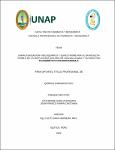Caracterización fisicoquímico y espectrometría ultravioleta visible de la isoflavona aislado de Swartzia simplex y su similitud filogenética con biochanina A

View/
Date
2022Author
Garcia Rengifo, Katherine
Marin Chistama, Jean Franco
Metadata
Show full item recordAbstract
Isoflavones are a subject of study due to their great bioactive properties in human health, within this group is biochanin A, which behaves as a unique phytoestrogen due to its estrogenic conformation similar to these; but also, because it shows cardiovascular protection due to its hypocholesterolemic effects. The objective of the study was to isolate nd characterize the isoflavone from the heartwood of Swartzia simplex from a sample of this species that is phylogenetically related to S. polyphylla collected at the "El Huayo" Arboretum of the Faculty of Forestry Engineering of the UNAP, located between the Zungarococha and Nina Rumi hamlets, District of San Juan Bautista, Province of Maynas, Loreto Region. The purified product was identified and characterized by determining its physicochemical and UV-visible spectrometric parameters. The results were as follows: Melting point 216 °C, Rf value in TLC run in 2% Methanol solution: 98% dichloromethane was 50, Molecular Weight 284.262 g/mol and wavelengths of maximum absorption in methanol were sh 261.330 nm and in sodium acetate methanol it was 272.327 nm. These results are similar to those shown in the literature for biochanin A. Las isoflavonas constituyen motivo de estudio por sus grandes propiedades bioactivos en la salud humana, dentro de este grupo se encuentra biochanina A, que se comporta como un singular fitoestrógeno por su conformación estrogénica similar a estos; pero también porque evidencia protección cardiovascular dado a sus efectos hipocolesterolémicos. El objetivo del estudio fue aislar y caracterizar la isoflavona del duramen de Swartzia simplex de una muestra de esta especie que guarda relación filogenética con S. polyphylla recolectada en el Arboretum “El Huayo” de la Facultad de Ingeniería Forestal de la UNAP, ubicado entre los caseríos de Zungarococha y Nina Rumi, Distrito de San Juan Bautista, Provincia de Maynas, Región Loreto. El producto purificado se identificó y caracterizó mediante la determinación de sus parámetros fisicoquímicos y espectrométricos UV-visible. Los resultados fueron los siguientes: Punto de fusión 216 °C, valor de Rf en TLC corrido en solución 2% de Metanol: 98% de diclorometano fue 50, Peso Molecular 284,262 g/mol y las longitudes de ondas de absorción máxima en metanol fueron 261, 330 sh nm y en metanol acetato de sodio fue 272, 327 nm. Estos resultados son similares a los que muestra la literatura para biochanina A.
Collections
- Tesis [295]

